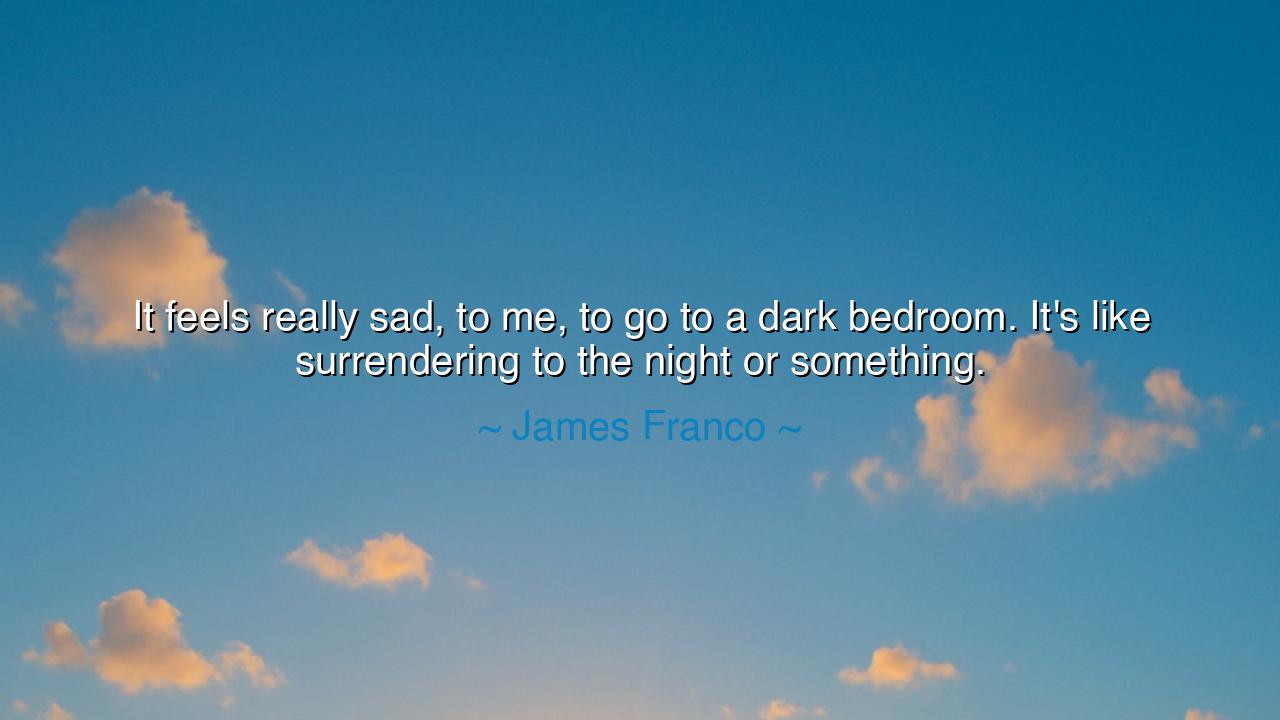
It feels really sad, to me, to go to a dark bedroom. It's like
It feels really sad, to me, to go to a dark bedroom. It's like surrendering to the night or something.






Hear the words of James Franco, quiet and contemplative, as he admits: “It feels really sad, to me, to go to a dark bedroom. It’s like surrendering to the night or something.” In this simple reflection, he touches on a truth that has haunted humanity since the dawn of time—the struggle with darkness, with endings, with the yielding of one’s body and spirit to rest, which in its silence feels too close to death itself.
The dark bedroom is more than a place of sleep; it is a symbol of the unknown, of absence, of the quiet void that follows the clamor of the day. To step into its stillness can feel like defeat, as though laying down one’s sword at the feet of the night. It is the moment when activity ceases, when the self no longer creates, speaks, or strives, but instead vanishes into unconsciousness. Franco names this as sadness, because it feels as though life itself is temporarily abandoned, surrendered into the hands of mystery.
The ancients, too, wrestled with this surrender. The Greeks called sleep the “brother of death.” To close one’s eyes was to mimic, if only for a while, the silence of the grave. And yet, they also revered Hypnos, the god of sleep, as a merciful force, for rest was needed if life was to continue. Franco’s lament, then, echoes this ancient ambivalence: to surrender to the night feels like yielding power, yet it is a yielding that is necessary, even sacred, for without it, no dawn could come.
Consider also the rituals of ancient Rome, where warriors would light lamps through the night to ward off darkness, for they feared the vulnerability of sleep. Or think of soldiers in battle, who often dreaded not the fight but the silence of night-watch, when the stars burned cold above them and the heart grew heavy with the awareness of mortality. Franco’s words carry this same unease: that in the darkness of the bedroom, one feels stripped of control, handed over to forces unseen.
Yet within this surrender lies hidden wisdom. For what is night, if not the counterbalance to day? What is sleep, if not the soil from which new strength rises? To resist the night is to exhaust the spirit; to embrace it is to allow renewal. The sadness Franco describes is true, but it can be transformed: if one enters the dark room not as prisoner but as pilgrim, the act of laying down becomes not defeat, but trust. It is the faith that morning will come again, and that light will return.
The lesson for us, then, is this: do not fear the moments of darkness in your life, whether in the literal night or in the symbolic seasons of sorrow and rest. They may feel like surrender, but they are not the end. They are the womb of new beginnings. Accept the stillness, honor the silence, and recognize that even the night has its purpose. The lamp of the soul does not go out when the room is dark; it waits, gathering its strength, preparing to burn again with the fire of morning.
So let Franco’s words be carried not only as lament but as guidance. When you step into your own dark bedroom, or when you face the dark seasons of your life, know that it is not simply sadness, nor only defeat. It is part of the great rhythm of existence, the ebb that allows the flow, the silence that makes the song possible, the night that prepares the dawn. Surrender, yes—but surrender with faith, for in yielding, you will rise again renewed.






AAdministratorAdministrator
Welcome, honored guests. Please leave a comment, we will respond soon